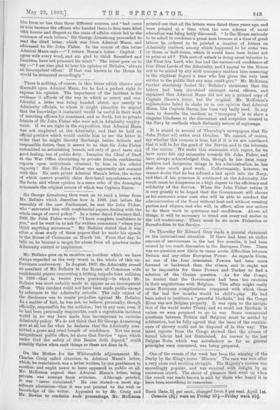On the Motion for the Whitsuntide adjournment Mr, Charles Craig
called attention to Admiral Mann's letter, which, he maintained, was a, letter written by one gentleman to another, and ought never to have appeared in public at all. Mr. McKenna argued that Admiral Mann's letter, being Private, was exempt from criticism. Although printed, It was " never circulated." He also stated—a most sig. nifioa.nt admission—that it was not printed by the wish or knowledge of the writer. Appealed to by Mr. Craig and Mr. Bowles to condemn suoh proceedings, Mr. McKenna pointed out that all the letters were dated three years ago, and were printed at a time when the new scheme of naval education was being hotly discussed. " Is the House seriously to be asked to condemn a great man because at a time of great labour he ordered to be printed a number of letters on Admiralty matters, among which happened to be some two or three, or half-dozen, which it would have been better not to print at all P This sort of attack is doing cruel injustice to the First Sea Lord, who has had the unreserved confidence of four First Lords of the Admiralty, and I appeal to the House' not to be misled by ally such trumpery matters into censuring' in the slightest degree a man who has given the very best service to the public that any man could give." Mr. McKenna further absolutely denied Mr. Bellaire's statement that the letters had been circulated amongst naval officers, and explained that Admiral Mann did not see a printed copy of Captain Bacon's letter, but the original. Mr. McKenna's explanations failed to shake us in our opinion that Admiral Mann, like Captain Bacon, has been very badly used. In any case, to describe the incident as " trumpery " is to show a singular blindness to the discontent and suspicion created in the Navy by methods which distinctly savour of espionage.






































 Previous page
Previous page